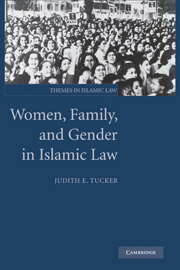Book contents
- Frontmatter
- Contents
- Acknowledgements
- Maps
- 1 Introduction
- 2 Woman as wife and man as husband: making the marital bargain
- 3 Woman and man as divorced: asserting rights
- 4 Woman and man as legal subjects: managing and testifying
- 5 Woman and man in gendered space: submitting
- 6 Conclusion
- Glossary
- Bibliography
- Suggestions for further reading
- Index
6 - Conclusion
Published online by Cambridge University Press: 05 June 2012
- Frontmatter
- Contents
- Acknowledgements
- Maps
- 1 Introduction
- 2 Woman as wife and man as husband: making the marital bargain
- 3 Woman and man as divorced: asserting rights
- 4 Woman and man as legal subjects: managing and testifying
- 5 Woman and man in gendered space: submitting
- 6 Conclusion
- Glossary
- Bibliography
- Suggestions for further reading
- Index
Summary
I began this investigation with an apparent paradox: many Muslim women cling to the notion that rights, privileges, and fairness for women and men alike can be best secured within an Islamic framework, despite the many examples in recent times of Islamic principles and laws being pressed into the service of misogyny. The question was further complicated for me by what I had read, as a historian, working with legal materials from the Ottoman period, many of which, despite their male authorship, exuded a sensitivity to the situations and concerns of women. In an attempt to explore the intersection of Islamic law with issues of gendered privilege and power, I turned my attention to some of the classical and medieval doctrinal debates, premodern practices, modern reforms, and recent instances of activism, all of which shaped and are still shaping the history of the law.
One of the questions I posed was that of discrimination. How has Islamic law treated women and men? Have women suffered certain legal disabilities as a direct result of their gender? The answer to such a seemingly simple question turned out to be fairly complex. There was no pretension of equality in many of the rules for contracting and living a marriage. Most legal schools allowed women to contract a marriage only under the tutelage of a male relative, a disability which survives into the contemporary era in some iterations of the law despite a history of legal reforms and activism focused on its elimination.
- Type
- Chapter
- Information
- Women, Family, and Gender in Islamic Law , pp. 218 - 225Publisher: Cambridge University PressPrint publication year: 2008
- 1
- Cited by

